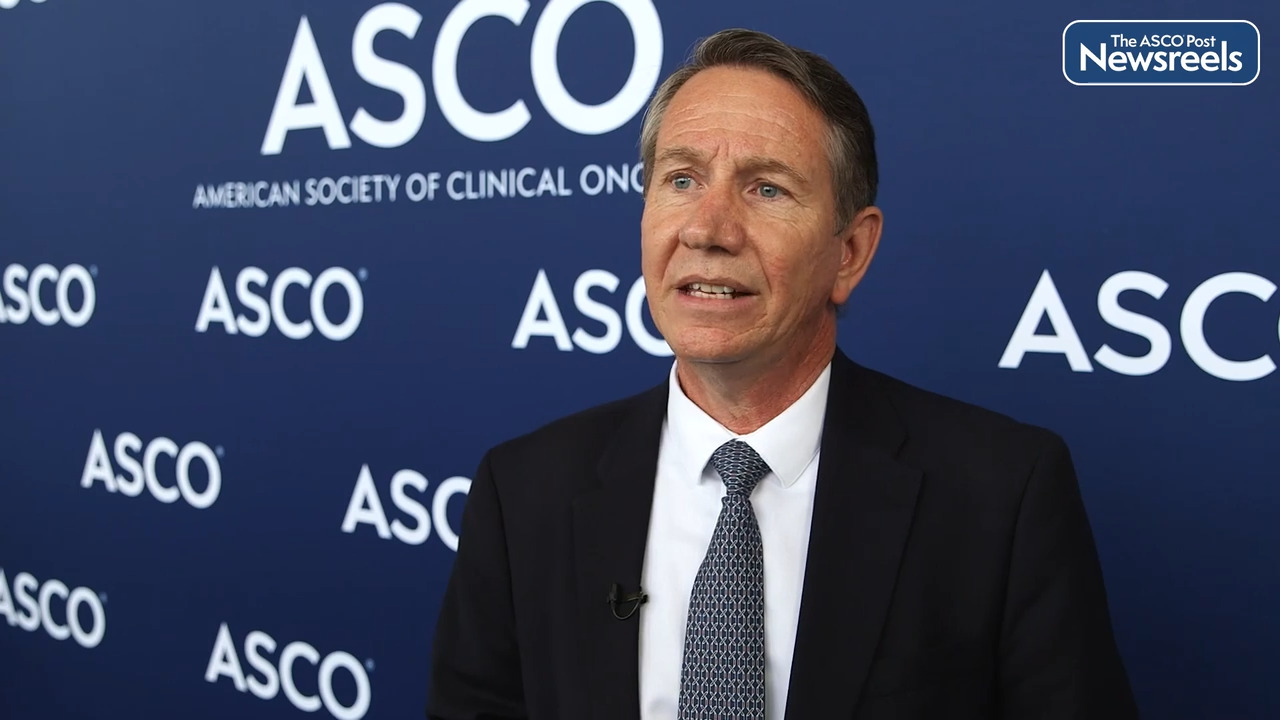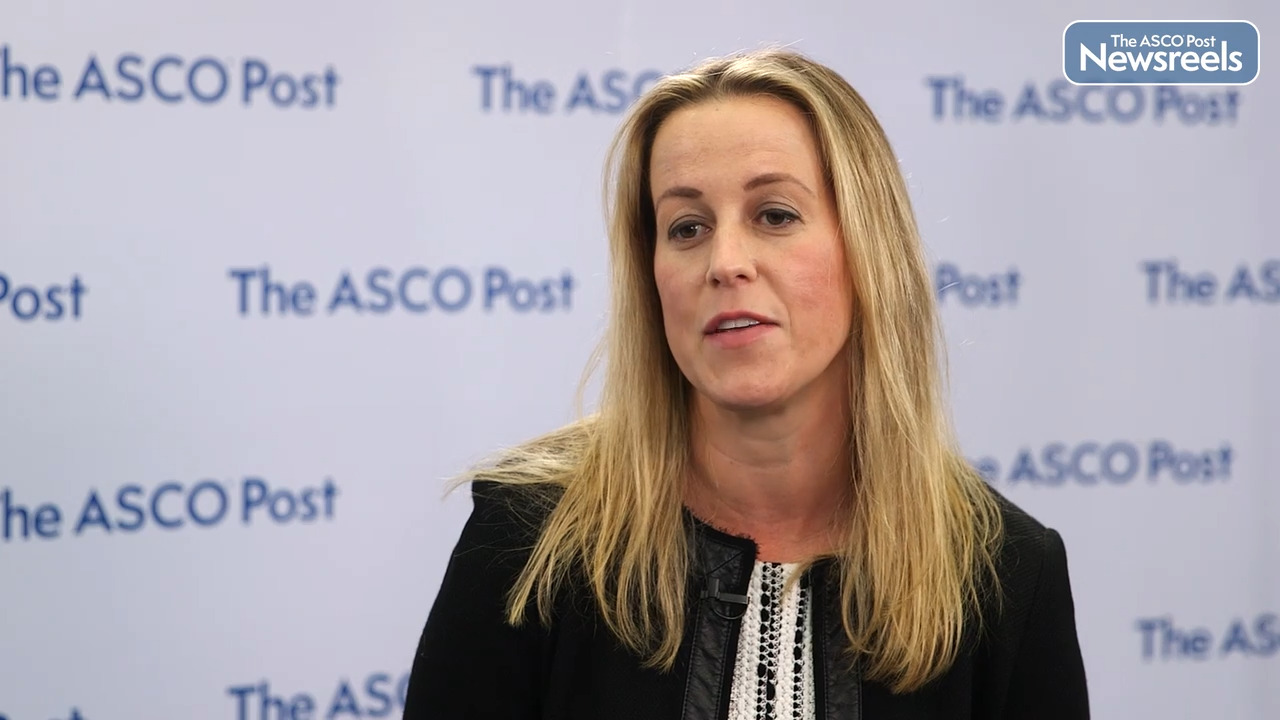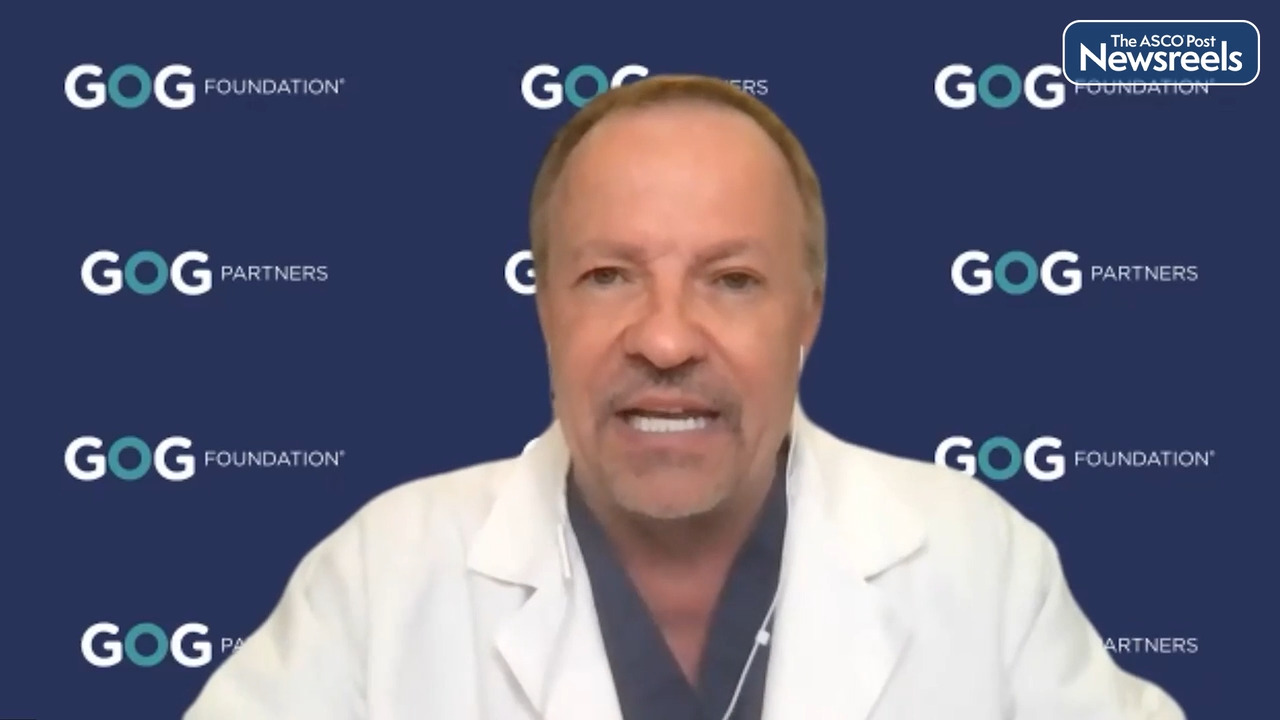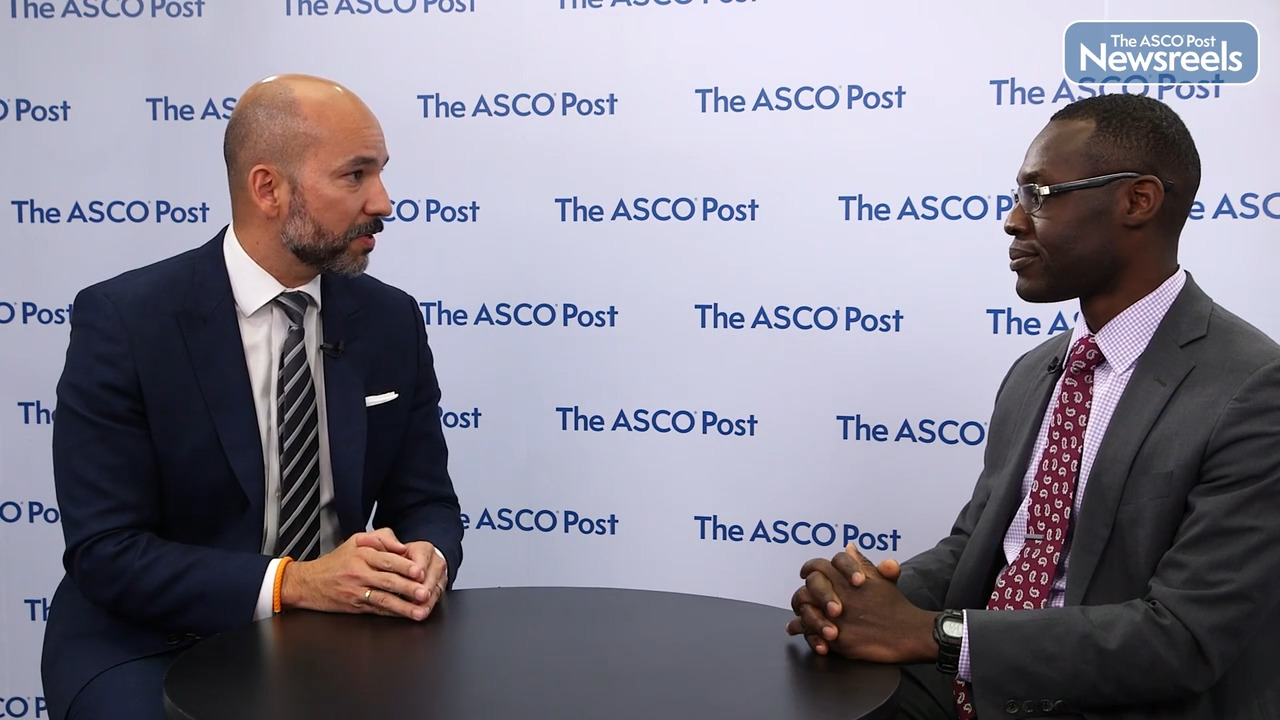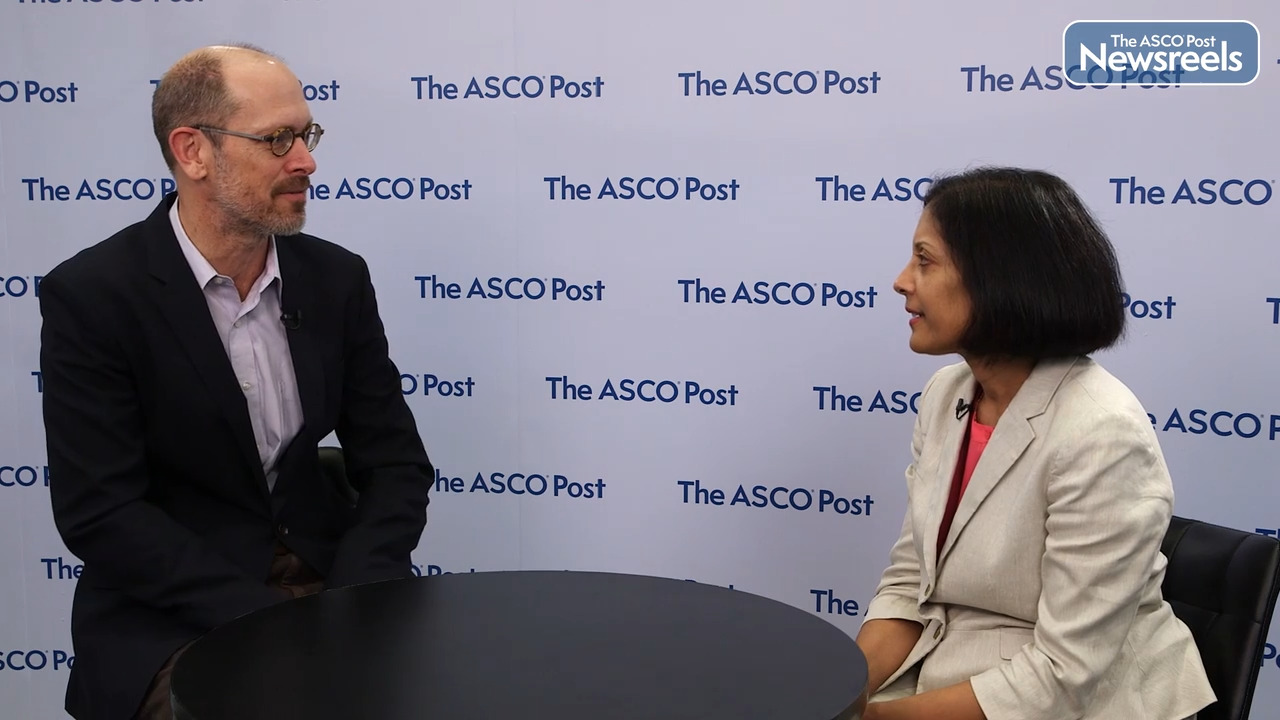Sue S. Yom, MD, PhD, on Oropharyngeal Cancer and the Feasibility of a Cell-Free DNA Plasma Assay
2022 ASCO Annual Meeting
Sue S. Yom, MD, PhD, of the University of California, San Francisco, discusses a translational analysis from the NRG-HN002 study. This phase II trial established the feasibility of the tumor tissue–modified viral (TTMV) human papillomavirus DNA assay in clinical trial specimens. The goal is to use such an assay to measure tumor volume, levels of TTMV over the course of treatment, and the association of TTMV to treatment outcomes (Abstract 6006).
Transcript
Disclaimer: This video transcript has not been proofread or edited and may contain errors.
At this meeting, we were pleased to present a translational analysis from NRG Oncology. NRG Oncology is a cooperative group that ran a study called NRG-HN002. This was a study looking for a de-intensification arm for HPV positive oropharyngeal cancer patients to take forward into a phase three setting in HN002. We had two arms on the study, which were a chemo radiation arm to 60 gray with weekly cisplatin, as well as an IMRT alone arm that's delivered over five weeks. This translational study was a study of blood specimens that were taking at three pre-specified endpoints. Baseline prior to treatment, after two weeks of radiation therapy or chemo radiation delivery, and then at two to four weeks after the end of the treatment and the participation rates were actually quite good, even though it was a separate substudy. We had about 50% participation over the course of the study, maybe weighing to about 40% by the end of the study. But half of patients donated specimens and we were able to find a few things with three different hypotheses. First of all, at the pre-treatment baseline, we found that there was a weak to moderate correlation of the detection level of the HPV-DNA fragments, which our tumor tissue modified. A little bit more specific than regular cell-free DNA. We were able to find a weak to moderate correlation with the overall gross tumor burden. We also found that 10% of patients were undetectable at baseline for a variety of potential reasons, which were continued to explore, could be mismatch with true HPV mismatched to P16, could be characteristics of the samples which were collected in a national study, could be characteristics of the infection, whether integrated or not. We'll continue to investigate that. For the intro treatment sample at two weeks, after two weeks of treatment, we did find a variation in changes over the course of the study in patients. There was some heterogeneity in the pattern of DNA response, which was interesting to see, although the vast majority of patients ended up at undetectability by the completion of treatment at the post-treatment final time point, but it was interesting to see that variation and also to see that it wasn't necessarily true of all patients that they had continuous decreases in the fragments per ml. Although if you looked at the median level overall, the trend was downward throughout the course of treatment. And then at the post-treatment time point, what we found was that essentially there seemed to be an association that was statistically significant with PFS events, and that is pretty notable because the patients on this study generally did pretty well. And we had a relatively small number of PFS events, but they were associated with continued detectability by the end of treatment. I think what's important about this study on an operational and sort of national scale is that this was done in a large scale national study within the cooperative group setting. And so it really shows the feasibility of being able to conduct meaningful translational research within that setting. And also it gives us a pathway forward. We have been able to confirm with this study that the level of tumor tissue modified HPV-DNA is appearing to be prognostic for outcome. And the fact that we're able to do in this study moves us towards the ability to standardize and possibly do more meaningful research in the future that moves us towards not just prognostic, but predictive biomarker status and potential implementation and actionability. I want to thank all the patients and investigators who cooperated in this study, it was a great team effort. And thank NRG headquarters, especially operations, biospecimen resource and statistical group for their support.
Related Videos
The ASCO Post Staff
Stephen M. Ansell, PhD, MD, of Mayo Clinic, discusses updated data from the ECHELON-1 trial, which showed that, when administered to patients with stage III or IV classical Hodgkin lymphoma, the combination of brentuximab vedotin, doxorubicin, vinblastine, and dacarbazine (A+AVD) vs doxorubicin, bleomycin, vinblastine, and dacarbazine resulted in a 41% reduction in the risk of death. These outcomes, says Dr. Ansell, confirm A+AVD as a preferred option for previously untreated disease (Abstract 7503).
The ASCO Post Staff
Erika Hamilton, MD, of Sarah Cannon Research Institute at Tennessee Oncology, discusses phase III data from the DESTINY-Breast03 study, which reinforced the consistent safety profile of fam-trastuzumab deruxtecan-nxki (T-DXd) vs ado-trastuzumab emtansine (T-DM1) in patients with HER2-positive unresectable and/or metastatic breast cancer. The findings also support T-DXd’s risk benefit over that of T-DM1 (Abstract 1000).
The ASCO Post Staff
Bradley J. Monk, MD, of the University of Arizona College of Medicine and Creighton University School of Medicine, discusses phase III findings from the ATHENA–MONO (GOG-3020/ENGOT-ov45) trial. It showed that rucaparib as first-line maintenance treatment, following first-line platinum-based chemotherapy, improved progression-free survival in patients with ovarian cancer, irrespective of homologous recombination deficiency status (Abstract LBA5500).
The ASCO Post Staff
Gilberto de Lima Lopes, Jr, MD, MBA, of Sylvester Comprehensive Cancer Center at the University of Miami, and Oladimeji Akinboro, MD, MPH, of the U.S. Food and Drug Administration (FDA), discuss a data analysis, which suggests that most subgroups of patients with advanced non–small cell lung cancer with a PD-L1 score of 50% or greater who are receiving FDA-approved chemotherapy/immunotherapy regimens may have overall survival outcomes comparable to or better than immunotherapy-alone regimens (Abstract 9000).
The ASCO Post Staff
Michael J. Overman, MD, of The University of Texas MD Anderson Cancer Center, and Smitha Krishnamurthi, MD, of the Cleveland Clinic, review three abstracts, all of which enrolled patients with newly diagnosed RAS and BRAF wild-type metastatic colorectal cancer with left-sided primary tumors. The discussion centers on what the study results indicate about the use of an EGFR therapy and weighing the risk to quality of life from rash, in particular (Abstracts LBA3503, LBA3504, LBA3505).
